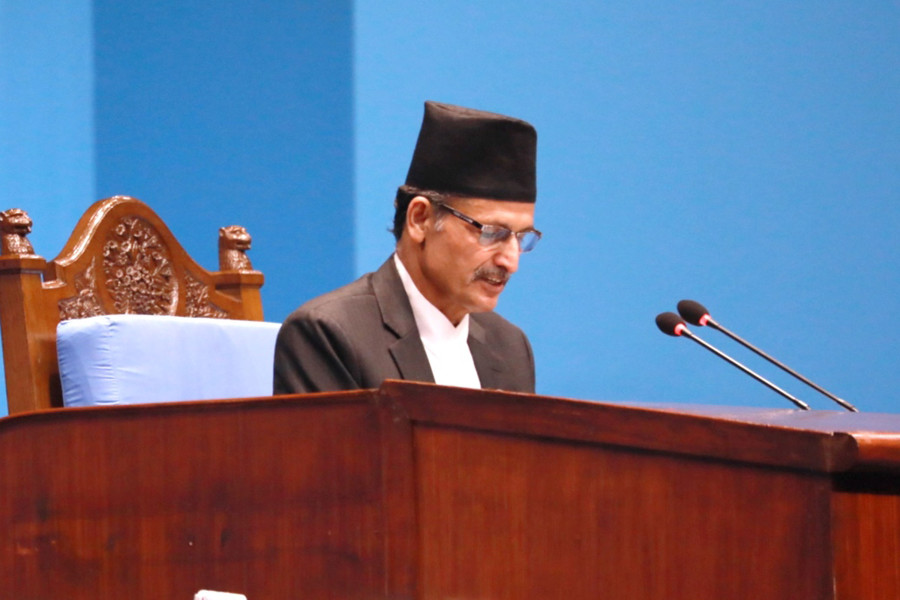National
Speaker is a failure—and ineffective, observers say
Chosen after a struggle between Oli and Dahal, Agni Sapkota is confused about his role and has failed to be assertive.
Binod Ghimire
CPN-UML lawmaker Bhim Rawal on Wednesday was given time in the House of Representatives to present his views on a proposed agreement to make Nepal a member of the Global Green Growth Institute.
After putting forth his views on the proposal for a couple of minutes, he switched the topic to the United States government’s State Partnership Program.
He not just asked why the government hadn’t dispatched a letter to the US government to inform the latter about Nepal’s decision to stay away from the SPP but also demanded a ruling from the Speaker to dispatch the letter immediately.
Rawal didn’t stop there. He said he would not leave the rostrum until the Speaker issued the ruling.
Satya Pahadi, who was chairing the House briefly in the absence of Speaker Agni Sapkota, asked him to leave the rostrum and allow others to air their views.
Rawal refused to budge.
Sapkota returned amid Rawal’s reluctance to leave. He reminded the UML lawmaker of the fact that the House cannot issue a ruling in a completely different matter when it was discussing something else.
Sapkota also said Rawal needs to follow his order as per the regulations of the House of Representatives. As Rawal ignored the call, Sapkota adjourned the House for 15 minutes. By then, Rawal had already taken 20 minutes of the lower house.
Rule 20 of the regulations says a lawmaker can air his/her views only with the Speaker’s permission. Similarly, the lawmaker should stick to the subject under discussion, according to Rule 23 of the regulations.
Rule 33 of the regulations gives the Speaker the authority to maintain order and discipline in the House. He can take action against any lawmaker who doesn't abide by the rules.
But on Wednesday, the Speaker took no action despite Rawal obstructing the House business.
“Rawal’s act was against the House discipline,” Min Bishwakarma, a Nepali Congress whip, told the Post. “The Speaker at least could have warned him not to repeat such acts. I had raised the issue with him but I don't know why he refrained from taking any action.”
Observers say Rawal’s act was highly undisciplined and unbecoming of a senior leader of the largest party who has been a lawmaker for around three decades. But in the meantime, Sapkota too has failed to perform his role as the presiding officer, according to them.
As Speaker, Sapkota has been criticised on several occasions either for failing to perform his job effectively, or for being biased and taking actions in breach of his jurisdiction.
Even more than two and a half years after being elected the Speaker, he often gets confused with the parliamentary process.
Those closely following the parliamentary proceedings say Sapkota is not just incompetent but also ineffective in leading the House.
“His lack of competence is obvious,” Som Bahadur Thapa, a former parliament secretary, told the Post. “However, I don’t solely blame Sapkota. His advisers are equally incompetent.”
When the presiding officer is weak, the House doesn’t function effectively.
As per the parliamentary practice, presence of at least one minister is a must in each House meeting. However, Thursday’s meeting of the lower house was delayed by 45 minutes because the minister showed up late. Yet, Sapkota didn’t feel it necessary to caution the government to send ministers on time.
This was the third time in around a month the House meeting was delayed in the absence of a Cabinet representative. In the same period, House proceedings have been deferred three times for lack of a quorum to endorse bills and proposals.
Experts on parliamentary affairs say Sapkota’s performance as Speaker has been unremarkable. “I have personally told him that he was ineffective and biased as the Speaker. I advised him to play a fair and effective role,” Surya Kiran Gurung, a former general secretary of the parliament secretariat, told the Post. “He needs to understand the gravity of his position and act accordingly.”
Gurung, however, thinks the Speaker did not take action against Rawal so as to avoid “irritating” the opposition.
Last year, Sapkota had moved the Supreme Court against President Bidya Devi Bhandari and then prime minister KP Sharma Oli for recommending and appointing chairpersons and members of various constitutional commissions through an amendment to the Constitutional Council (Functions, Duties, Powers, and Procedures) Act effected with an ordinance.
However, he is now silent despite the Deuba government registering a bill to amend the Act incorporating most of the provisions from the ordinance the Oli government had issued. There are several instances to prove that Sapkota is biased towards the ruling coalition, says Gurung.
Experts on parliamentary affairs say Sapkota’s performance has shown that Speaker candidates must be picked carefully, by analysing if s/he can do justice to the esteemed position. They say Sapkota was picked because he is close to Pushpa Kamal Dahal, chairperson of the CPN (Maoist Centre).
Sapkota was picked as a candidate for Speaker from the then Nepal Communist Party (NCP) after weeks-long wrangling between the two chairs of the party, Dahal and Oli.
“The performance of Parliament has gone down in every respect—from the role of the presiding officer to the delivery of lawmakers,” Daman Nath Dhungana, a former Speaker, told the Post.
“At the least, the parties must be careful while picking the candidates for President and Speaker roles. These two positions cannot be used to accommodate party leaders.”




 13.12°C Kathmandu
13.12°C Kathmandu














